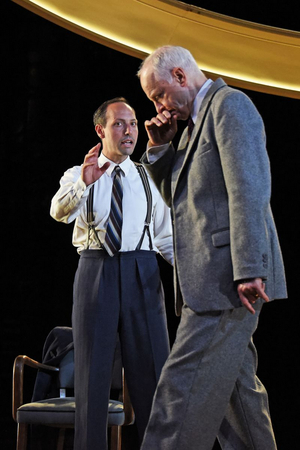Review: COPENHAGEN, Rose Theatre
A fascinating subject weighed down by too much detail

![]() In 1941 two leading physicists secretly met in Nazi-occupied Denmark to discuss the race between Hitler and the allies to create the nuclear bomb. These men were Werner Heisenberg, a German working on Hitler's bomb programme, and his old mentor Niels Bohr, a half-Jewish Dane with links to the United States' nuclear programme. First seen in 1998, Michael Frayn's fascinating but ultimately frustrating play, Copenhagen, explores several possibilities of what may have happened between the men.
In 1941 two leading physicists secretly met in Nazi-occupied Denmark to discuss the race between Hitler and the allies to create the nuclear bomb. These men were Werner Heisenberg, a German working on Hitler's bomb programme, and his old mentor Niels Bohr, a half-Jewish Dane with links to the United States' nuclear programme. First seen in 1998, Michael Frayn's fascinating but ultimately frustrating play, Copenhagen, explores several possibilities of what may have happened between the men.
Heisenberg's failure to make a crucial calculation means that Germany does not succeed in its bomb, whereas Bohr's work contributes to thousands of deaths. Frayn delves into what happens when science and politics overlap; what is the truth, what is memory and where does morality sit in the face of such huge consequences?
The cast is strong and has a good chemistry. As Bohr, Malcolm Sinclair takes the role of a paternal figure, affectionate to his old friend, but frustrated by the occupation of his own country and how Heisenberg's knowledge is being used by the Germans.
Philip Arditti's Heisenberg is more impetuous and prone to rash thoughts. He shows waves of both energy and quieter reflection on the consequences on events. There is an immediate sense of convincing friendship between the men and you feel real sympathy for these old friends who are placed on opposing sides of a terrible conflict.
Haydn Gwynne is excellent as Margrethe, Bohr's intelligent and measured wife. Gwynne is astute and calm with an acid-tongue that continually plants the men back on earth when they get carried away with their theories. Gwynne provides much of the emotion to this story of physics.
Emma Howlett, making her professional debut, took over from Polly Findlay and directs with a fast and continuous pace. This is a play with literally all talk and so the conversation has to capture and engage.
Alex Eale's sparse set contains just wooden chairs and an impressive giant halo suspended above the stage, which subtly changes the light from starkly bright to warmer according to the mood of the conversation happening below.
The basis for the play is very intriguing, but the language of the science becomes so complex it is often difficult to follow. Unless you have an in-depth knowledge of prominent physicists working between 1920 and 1945, the constant barrage of random names will mean little.
Frayn's research seems impeccable, but it feels that in the effort to fit in so much detail, the play is just too long. The first act could stand alone as the play; after two and half hours, it feels dense and heavy.
Despite the best efforts of a talented cast, Copenhagen feels less like a fascinating exploration of a meeting between two brilliant minds, and more like an exercise in hard work.
Copenhagen is at Rose Theatre until 24 July
Photo Credit: Nobby Clark
Reader Reviews

Videos

